Summary: A joint Karen, Karenni and Shan Free Burma Ranger relief team conducted a relief mission to displaced Karenni people on the Karen-Karenni border from 17 June to 9 July, 2004. During this 23 day mission the team treated 850 medical patients and 20 dental patients. The main medical problems treated were Acute Respiratory Infection, Malaria, and Anemia. There was one delivery of a baby girl, and four surgical operations. The team visited two main displaced persons hide sites and helped one group of Karenni villagers who were fleeing the attacks of the Burma Army. Distance walked - 238 miles.
Note: Excerpts of the mission report follow the photography. The full mission report is available at www.freeburmarangers.org
Additional photography
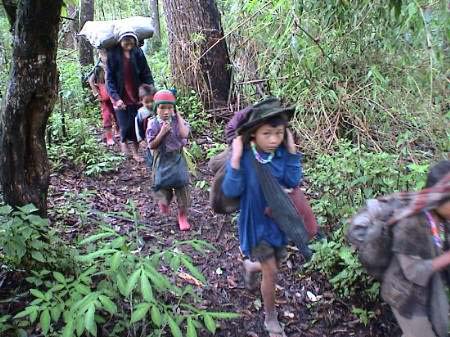
Karenni IDPs fleeing
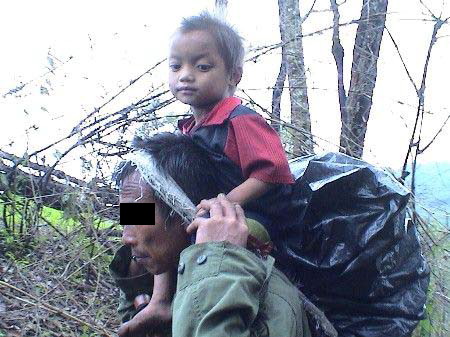
FBR Relief Team member carrying an IDP child
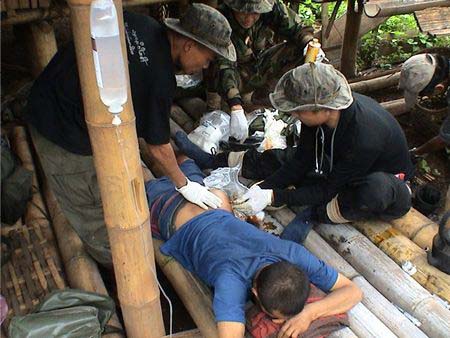
Relief team medics perform an operation
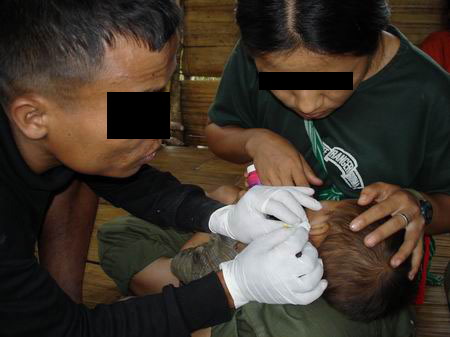
FBR medics treat a Karenni baby
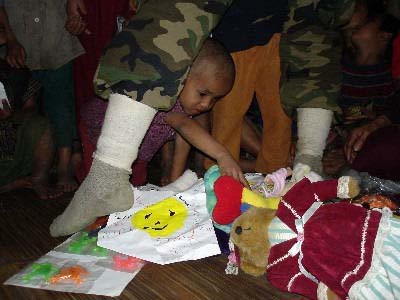
Good Life Club with Karenni IDPs
Current Situation of the 5,000 displaced Karen and Karenni people
In the Burma Army January 2004 offensive, 5,000 Karenni and Karen people were displaced along the Karen and Karenni border. 2,000 Karenni people were displaced from 20 villages in this area. They were first ordered to move by Burma Army LIB 249. They were to move to relocation sites (including Mandaline, Mawchi, Bwa Doh,"8-mile" village, and Ko Sa Kee) on the Mawchi road. The villagers did not comply. They said that they were afraid to move near the road because many of them had been used as forced labor to build the road. They were afraid of forced labor and beatings by the Burma Army. Also they would not be able to farm their land and harvest their crops if they relocated. On January 23, the Burma Army 55th division enforced the earlier relocation order. On 26 and 29 January the 55th Division sent ten battalions to attack the villages, resulting in over 2,000 Karenni displaced. 1,000 people fled to Toungoo district in the Karen State, while 1,000 fled into Papun district (Muthraw) of Karen State. The Burma Army chased the Karenni villages into Karen State and then attacked Karen villages causing over 3,000 Karen to flee. This made for a total of 5,000 people displaced by this offensive, (2,000 Karenni, 3,000 Karen).
The Burma Army offensive ended in late January 2004 and by early June 2004 most of the displaced Karen and Karenni villagers had returned home. Of the 2,000 Karenni IDPs (internally displaced persons), approximately 350-400 Karenni people are still in the Karen State. In the Karenni State, some of the displaced have returned but cannot live in their villages. They live in hiding nearby so that they are close enough to tend their fields but are still relatively safe from attack. 600-700 people went to relocation sites during the offensive but have now been allowed to return to their villages because they had no food in the relocation sites. Most can live in their old villages, but some stay only near their fields.
During the January offensive, the IDPs received some emergency relief from FBR teams and once the offensive ended rice from the KSWC (Karenni Social Welfare Committee). The rice was sufficient for the months of April and May and in June, local villagers and the Karenni resistance provided rice. There is a need for more rice in July for the Karenni IDPs who remain in Karen State (approximately 350-400 in Papun District – Muthraw, and 30-40 in Toungoo District). They do not have food for next month. It is too late for them, even if they were able to return to their villages, to have any harvest during 2004. In May plastic sheeting for shelter for these IDPs was sent from the KSDP (Karenni Student Development Program). The Burma Army has placed landmines extensively in the areas south of the Mawchi Road and near the village of Paho (three miles north of the Karen border). The Karenni resistance has removed four landmines near the village so far. On May 10 at 11 a.m. a 30-year-old Karenni man was killed when he stepped on a Burma Army landmine while trying to return to his village. On May 26 at 9 am, Naw Ger Moo Paw, a 16-year-old Karenni girl, stepped on a landmine near Htoo Ka Htoo village northwest of Mawchi. She lost her leg and has been sent to a mobile clinic in the Karen State.
Burma Army Battalion LIB 135 approached the Karenni village of Paho on 25 June 2004. The villagers fled and are now in hiding. The villagers are fleeing with only what they can carry and will try to find a place to hide tonight, 26 June 2004.
Interview: landmine victims, forced labor
Name: XXX XXX (female)
Age: 45 years old
Married, 4 children
Village: XXX XXX (Karenni State)
XXX XXX left her village five months ago because she was afraid of Burma Army troops and wasn't sure when they were coming to her village. In the past, her husband and daughters (one is 16 years old) had to build a road, and carry rice and other supplies for Burma Army Division 55 troops. She was afraid of more forced labor for the Burma Army.
In July 2002, Tha Do Mee, a man from XXX XXX village was killed by stepping on a Burma Army landmine. Six villagers, including his wife went to look for him. They found his body and near it was another landmine that had not exploded. When the villagers tried to remove his body, the landmine went off. Three men were slightly wounded, two men lost legs (XXX XXX, XXX XXX), and Tha Do Mee's wife (XXX XXX) was also seriously wounded in her chest and abdomen. When Tha Do Mee died he had one child and his wife was pregnant.
XXX XXX asks people to remember her in their prayers, as they have no chance to work or eat properly. She says she needs food and blankets. The IDPs in her site are going to run out of food soon. One of her daughters went to a nearby village to work. There is a school in the hide site, but no consistent medical care.
Interview: killing by KNSO (Karenni National Solidarity Organization), beating, torture
Name: XXX XXX (female)
Age: 33 years old
Married, five children
Husband's name: XXX XXX
Village: XXX XXX (Karenni State)
Her husband's father and mother and brother were killed by the KNSO in February 2004. They were told by the KNSO that they were to go to Mawchi forced relocation site, but didn't want to go. The KNSO told them that anyone who were followers of resistance leaders needed to run away to other countries, but those who wanted peace should go (to Mawchi). The family was separated after they fled their village, with her parents-in-law in one place, her brother-in-law in another and herself and her husband in a third place. She and her husband left their village on February 13th, 2004 to go into hiding. On February 27th at midnight, her brother-in-law was hunting in the jungle and was killed by KNSO troops. Also on February 27th, at 5am, her mother-in-law and father-in-law were killed by KNSO troops. On February 28th, the troops burned their bodies. Their were two other villagers with her in-laws who escaped the KNSO troops with only some injuries and they told her what happened to her family. Her family first went to a district in Karen State, but it was too difficult to survive, so they moved to this hide site.
Two of her sisters have been arrested by the KNSO and were beaten by them (slapped and punched). They were accused of supporting the Karenni resistance forces. One nephew of hers, accused of supporting the Karenni resistance forces, was arrested by the KNSO and sent to Loikaw prison, where he was tortured with electric shocks. When his wife went to visit him in prison, she was not allowed to see him.
"Now I am in a strange place where I can't find my way around. The leaders here have made good arrangements, but I don't know what happened to my rice barn or my parents' rice barn."
Interview: Landmine victim
Name: XXX XXX (male)
Age: 37 years old
Married, 3 children
Village: XXX XXX (Karenni State)
Occupation: Farmer
In January 2004, he and his family left their village because the Burma Army Division 55 ordered them to move to Mawchi forced relocation site. They were afraid of the Burma Army troops because they said they would kill anyone left in the village.
On July 7, 1997 he stepped on a landmine. He was on a trail, had already found one landmine and was trying to avoid another one. Two other people with him were wounded by the landmine. It took one week for him to reach a clinic. The Burma Army troops had burned all of the houses in his village (over 30 houses) at that time. They ate some rice and destroyed the rest. He can't remember the name of the Burma Army unit, but remembers the leader's name was Major Tha Aung.
Interview: landmine victim, forced labor
Name: XXX XXX (Female)
Age: 70 years old
Married (husband deceased), 2 children
Village: XXX XXX (Karenni State)
Two years ago, her son (XXX XXX, 30 years old), stepped on a landmine on a car road and was killed. The Burma Army had to leave the road unfinished and placed landmines on it when they left the area. He was married and had two children. His wife and children are now in Mawchi forced relocation site.
Two years ago, the Burma Army troops came to her village and forced everyone out of their houses. They went into her house, took her husband's gun and their chickens. She tried to take the chickens back and they pointed their guns at her. She said the Burma Army has come and shot in their village before.
The Burma Army forced people in her village to be human landmine sweepers and carry things for the troops. She had to carry rice on a one day trip for the Burma Army. She was 'already old' and she carried around eight kilos. She was not given payment or food by the Burma Army. Now she is always afraid when she hears a gunshot.
Interview: Forced labor, forced relocation
Names: XXX XXX and XXX XXX (husband and wife)
Ages: 54 and 45 years old
8 children
Village: XXX XXX (Karenni State)
In their village both husband and wife were forced to clean the car road nearby and carry things for the Burma Army troops. They were also asked by KNSO and Burma Army troops to bring bamboo to them. The villagers were given no compensation for the bamboo or pay for their work. He estimated that incidents like this happened at least ten times per year. "When you are under their control, whenever they ask you to come, you must go." (referring to the Burma Army)
In 1997 he was used by the Burma Army troops for forced labor. He was carrying wounded Burma Army soldiers. When the soldier he was carrying was distracted he escaped.
Their family was forced to relocate from their village by KNSO and Burma Army troops to a forced relocation site near Mawchi. They stayed there for two months before fleeing to this hide site in January 2004. They ran the whole night after they left the forced relocation site.
The leaders in the area of the IDP hide site are helping them. Their children are separated for the sake of education - two in another country and one is in a larger city. He wants them all to have a good education.
Interview: forced relocation, killing
Names: XXX XXX and XXX XXX (husband and wife)
Ages: 56 and 45
6 children
Village: XXX XXX
They left their village in January 2004 and moved to a forced relocation site. Soon after that they escaped from the relocation site and moved to this hide site. They were expecting a lot of forced labor and thought they were too old to endure that.
Her first husband was killed in 1982. He was the head of the village and wouldn't surrender their arms to the Burma Army troops. The troops poured water and chilies into his mouth, tied a plastic bag around his head with water in it and then took him outside the village and killed him. The villagers found his dead body by a stream. The Burma Army had also killed her uncle after cutting off his tongue, ears and nose.
Interview:
Name: XX XX
Married, 12 children (oldest 17 years, youngest is 2 months)
Village: Paho
The Burma Army from Mawchi gave an order for their village to move within five days. This was after Christmas, late December 2003/early January 2004. His family had no time to get all of their possessions. They went to XXX XXX for one month and after that moved to XX XX. He is farming in this village now.
In Paho his house was burned twice within the past five years by the Burma Army from Mawchi. The Burma Army troops who burned his house also took his chickens and other possessions. Many times the Burma Army took things from villagers in Paho. The KNSO (Karenni National Solidarity Organization) also asked villagers to come see them many times, but they never went. The KNSO came one time to Paho in October 2003 and destroyed all of their banana plantations, rice and vegetable farms. He never experienced forced labor. Seventeen years ago he was arrested by Burma Army soldiers. They tied his hands and neck and kicked his stomach. They accused him of being part of the Karenni resistance and asked for his gun.
"If they come, we run away".
Interview:
Name: XXX XXX
Age: 30
Married, 4 children (oldest is 7 years, youngest 7 months)
Village: XX XX
She left her village six months ago. The Burma Army troops told their village they had to leave or they would be killed. She didn't take anything with her, she just ran away with her children. She stopped many places on her way to this village - in the jungle, on people's farms, and in other villages. She came to this village (where she grew up) to live with her mother, who is blind. She married a man from XX XX.
For many years, since 1999, before fleeing her village she stayed on her farm rather than in town because the Burma Army troops always came to her village. They called the villagers for forced labor, but they always ran away. They heard the Burma Army would kill them if they disobeyed.
"For four years she has not had a good sleep, she is always ready to run."
(In March 2004 all of the villagers from XX XX fled the village when the Burma Army shot from a nearby ridge into the village. She arrived one week after this happened. The people from this village also ran during the Burma Army offensive of January 2004).
Interview:
Name: XX XX
Age: 32 years old
Married, 5 children
Village: XXX XXX (headman of village in 1996-1997). Population is 70 households or over 400 people.
The Burma Army came to this area in the past (before 1997), to XX XX village, but did not burn anything down. On 17 June 1997 the Burma Army came to XXX XXX and stayed two nights. There were 600 Burma Army troops in the area at that time, in positions in and around the village. They ate all of the chickens and the pigs. The Burma Army troops then burned all of their houses and rice barns. The church and school were left standing. At that time there were 80 households (over 450 people). The villagers found out the troops were on their way only when they arrived in a village nearby, XX XX, so they did not have time to take many of their possessions. All of the villagers fled in different directions before the troops arrived, so no one was hurt. The villagers hid for 22 days. When they came back, there was nothing left and they had to rebuild their homes and rice barns in the rainy season.
There have been no problems with Burma Army troops in their village since that time until January 2004. The troops came into the area, not into the village proper, in January. The villagers fled and stayed for one month in hide sites. There were villagers who were seriously ill while they were hiding.
Interviews with porters who escaped from the Burma Army:
Name: XX XX
Age: 25
Burman, Buddhist
He was working at a restaurant in XX XX town, Irrawaddy Division. He is the oldest of five children. He was arrested by the police for fighting with a group of people (including one girl) on the road. The girl's parents are officials in the SPDC (State Peace and Development Council). He said he was accused on many counts. The Burmese laws he said he was sentenced under were Act 325 which means you can be arrested for 'hurting someone' and Act 394, which is used against people who are 'troublemakers.' He said he was falsely accused. He was sentenced to jail for four years in Insein Prison. He said that if he could have paid enough money, he wouldn't have been sentenced for so long. After a few months of being in prison, he was sent to Maung Soon concentration camp along with approximately 150 other prisoners. In the concentration camp, they were forced to do hard labor. All of the prisoners were shackled on their ankles.
In the camp he was often beaten with a hard plastic pipe. On 28 February 2003, 100 of the prisoners were sent to Naunglyabin Burma Army camp in four trucks where they stayed one week and then they were sent to Toungoo Prison. In March, 100 porters were sent to Shwey Kyin town where they had to do forced portering for the Burma Army Battalions LIB 598, LIB 350, and LIB 349. The porters had to carry rice, milk, fish paste, and soybeans to a Burma Army camp. On the way back to Shwey Kyin they had to carry ammunition (1-120mm shell and 4- 81mm shells per person). They spent 21 days going back and forth between this town and the Burma Army camp. He saw many other porters being beaten by the Burma Army soldiers, especially those who could no longer carry their loads, work or climb the mountains. The porters were only given two meals per day. It was not enough food for them. 14 porters out of the 100 disappeared. He believed those porters were either killed or beaten and left behind for dead.
1 April 2004 he escaped. Two days later he was arrested again by the troops. He was beaten by the Burma Army troops 120 times on his buttocks with a large cane stick. Every porter was ordered to beat him two times each. This happened every time a porter escaped and was recaptured. He was put in the Burma Army LIB 351 prison on 8 June 2004. On 20 June 2004, 30 porters, including him, were sent to the front lines. This time he had to carry about 40 kilos. He carried supplies for the Burma Army troops. It took them seven days to travel from the LIB 351 Burma Army camp to Zaw Htaw Burma Army camp. While they were walking with their loads, groups of five porters were tied together by their hands to make sure they didn't escape. They arrived at Zaw Htaw Burma Army camp on 27 June 2004. He and two other porters were put in the kitchen. Around 11pm, the three of them ran away from the camp. On 29 June, he and the two other men saw a farm hut with villagers, where they were met by some KNU (Karen National Union) authorities. The authorities have fed and taken care of the porters.
Name: XXX XX
Age: 24
Burman, Buddhist
Occupation: Painter
He was arrested on 14 July 2003 for selling tickets for the illegal lottery. He was sentenced to jail for three years. A few months after going to jail he was sent to Maung Soon concentration camp along with 100 other porters. They had to do hard labor in the concentration camp.
On 28 February 2003, 100 of the prisoners were sent to Naunglyabin Burma Army camp in four trucks where they stayed one week and then they were sent to Toungoo Prison. From Toungoo Prison, he was sent to Than Daung Burma Army camp, where they had to do forced portering along with 30 Karen girls. He believed the girls were from nearby villages. Some of the girls were 13, 14 and 15 years old. All had to bring their own food. They had to carry food and other supplies to another Burma Army camp in the front lines. They had to carry the same size loads as the men who were porters, but they only had to work with them for two days. On the way back from the camp, everyone had to carry ammunition for the Burma Army troops. They had to go back and forth between army camps for 21 days. The loads were very heavy, over 50 kilos (100 lbs). He witnessed a porter who died from an injury inflicted by a Burma Army soldier who beat him for not being able to carry his load. The soldier beat the porter and dragged him by his chin with a metal detector (used to find landmines, it has a hook on top).
The porter died from these injuries. He saw many porters who were beaten by Burma Army troops (LIB 598, commanding officer Captain Win Shwe) with the butts of their guns. He also saw another porter who could no longer carry his load and was pushed by a Burma Army soldier into a fire. The porter's back was burned. He was never beaten because he tried very hard to carry his load and work hard. Those porters who escaped and were recaptured were beaten. The porters who refused to beat them or who beat the escapee softly were beaten themselves.
Originally there were 100 porters, only 86 returned to Than Daung Army camp. He saw four porters escape. He witnessed three porters being killed by Burma Army soldiers. The remaining seven were missing and he believes they were beaten to death or left for dead. The youngest porter he saw was 17 or 18 years old and the oldest one was 53 years old. The oldest man was also beaten when he could no longer carry his load.
He and the remaining porters were sent back to Toungoo Prison. In May 2004, 100 porters, including him, were sent back to Than Daung where they were under the control of Burma Army IB 39 and LIB 124. They stayed there for two days. On 13 May 2004, he and 29 other porters were forced to carry loads for Burma Army troops. When they were finished they were sent back to Toungoo Prison. On 18 June 2004, he was sent to Zaw Htaw Burma Army camp with Burma Army LIB 351 troops. The man in charge of the column was Captain Than Soe. On this trip, he had to carry the officer's backpack, which held two large landmines, 20 large batteries, two bottles of I.V. infusion, and other medicine. They arrived in Zaw Htaw on 27 June 2004. On the way he observed most of the Burma Army troops being very brutal and beating the porters often. The porters were not given any water or allowed to go and find water. On the way, groups of five porters were tied together by their hands so they would not escape.
They arrived at Zaw Htaw Burma Army camp on 27 June 2004. He and two other porters were put in the kitchen. Around 11pm, the three of them ran away from the camp. On 29 June, he and the two other men saw a farm hut with villagers, where they were met by some KNU (Karen National Union) authorities. The authorities have fed and taken care of the porters.
He wants people to know that the way he was treated was unjust. If he really deserved to be in jail for three years, he would be happy to serve his sentence. He is angry because he was sent to the front lines as a porter. The load he had to carry was too heavy in relation to the amount of food he was given.